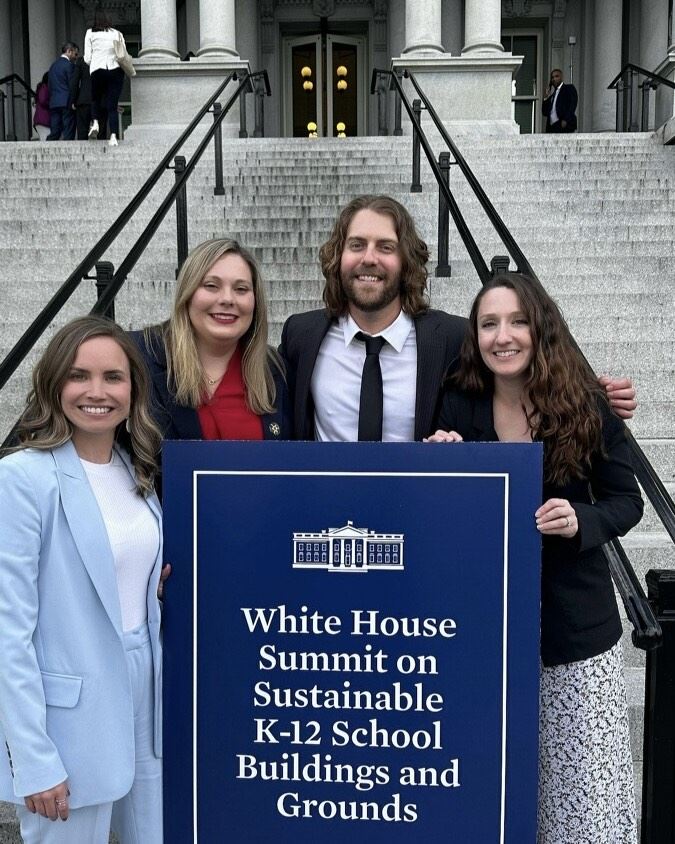-
PPS Senior Program Manager of Energy & Sustainability Invited to White House Summit
5/17/2024When Aaron Presberg first got the email from the White House, he thought it was some sort of prank.
Then he shared the message with a few colleagues who assured him that it was no joke, and the exciting reality that he had been invited to Washington, D.C. to present at the White House’s first-ever Summit for Sustainable and Healthy K–12 School Buildings and Grounds started to sink in.
“It’s hard to put into words,” said Presberg, who is in his eighth year as PPS’s Senior Program Manager of Energy and Sustainability. “It was surreal, to think that I’d be able to present my work alongside peers I’ve worked with for years and to do it at the White House of all places. It was really cool.”
The summit grew out of the Biden administration’s stated commitment to equitable access to energy-efficient, climate-resilient, and healthy school facilities. It was jointly hosted by The U.S. Department of Energy, the U.S. Department of Education, and the Environmental Protection Agency.
The event itself began with Deputy Secretary of Energy David M. Turk recognizing the Efficient and Healthy Schools program awardees for setting “examples for energy-efficient schools that facilitate effective learning and keep students and teachers healthy.”
PPS was particularly honored for being a “Solutions Strategist” and taking a pioneering approach to achieving their goal of net zero emissions by 2040.
At the summit, a series of keynote speakers took the stage, and those speeches were followed by several panel discussions. Presberg was asked to present on PPS’s efforts to modernize its buildings to be more climate resilient. He also spoke about the district’s partnership with Multnomah County to use those buildings as cooling shelters and healthy spaces in the event of extreme heat and wildfires.
For Presberg, it only makes sense that school districts like PPS would take the lead in addressing climate change, given the fact that schools serve young people and young people are on the frontlines of the battle against climate change.
“Students are bearing the brunt of climate change impacts, and they’re looking toward the future, knowing that if we don’t act, things will only get worse,” he said. “Schools have a unique responsibility to try everything they can to address these issues, but we also face unique challenges in addressing them, given that, in my opinion, we’re underfunded, especially in facilities, maintenance, and operations.”
Presberg saw the summit as both an opportunity to learn from his peers and a useful reminder of the crucial nature of sustainability efforts at the district level.
“It was really special to share this moment with my counterparts from other districts and to get in the weeds with them on climate initiatives,” he said. “Events like this make you step back and really think about how important the work is that we’re doing and why we’re doing it in the first place.”
By Month
- June 2024
- May 2024
- April 2024
- March 2024
- February 2024
- January 2024
- December 2023
- November 2023
- October 2023
- September 2023
- August 2023
- June 2023
- May 2023
- January 2023
- December 2022
- November 2022
- October 2022
- September 2022
- August 2022
- July 2022
- June 2022
- May 2022
- April 2022
- March 2022
- February 2022
- January 2022
- December 2021
- November 2021
- October 2021
- September 2021
- August 2021
- July 2021
- June 2021
- May 2021
- April 2021
- March 2021
- February 2021
- January 2021
- December 2020
- October 2020
- September 2020
- August 2020
- July 2020
- June 2020
- May 2020
- April 2020
- March 2020
- February 2020
- January 2020
- December 2019
- November 2019
- October 2019
- September 2019
- August 2019
- June 2019
- May 2019
- April 2019
- March 2019
- February 2019
- January 2019
- December 2018
- November 2018
- October 2018
- September 2018
- August 2018
- July 2018
- June 2018
- May 2018
- April 2018
- March 2018
- February 2018
- January 2018
- December 2017
- November 2017
- October 2017
- September 2017
- August 2017
- July 2017
- June 2017
- May 2017
- April 2017
- March 2017
- February 2017
- January 2017
- December 2016
- November 2016
- October 2016
- September 2016
- August 2016
- July 2016
- June 2016
- May 2016
- April 2016
- March 2016
- February 2016
- January 2016
- December 2015
- June 2015


